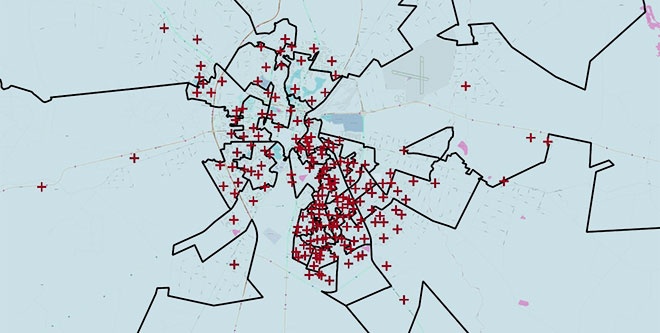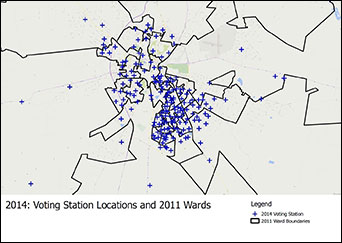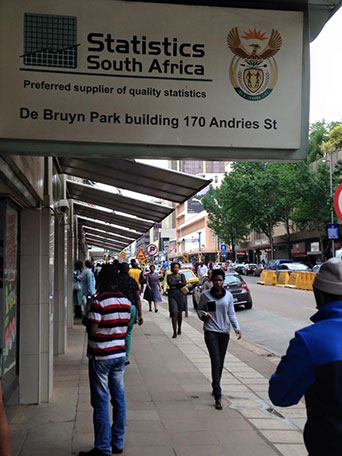Micro to Macro: Small Decisions That Shape a Nation

Mapping image from de Kadt's research.
“I believe in science. And social science.”
That tweet, by Daniel de Kadt, is also his credo. Born, raised and educated in South Africa, de Kadt believes that scientific rigor and data-driven debate are key to curing the social and economic ills of his native country. In a recent article, the doctoral candidate in political science decried the “strong opposition to the use of quantitative evidence and scientific methods in South African social sciences” and called on academics to consider the country’s problems as “opportunities to produce cutting edge research that changes how both our society and those around us build solutions.”
“I’ve always been very interested in rigor and formality,” says de Kadt, who studied economics and linguistics as an undergraduate at the University of KwaZulu-Natal, in Durban. An accomplished amateur photographer, he detects this aesthetic in both his hobby and his research. “My photographic style is very, very clean, and that’s what I look for in academic work as well as keeping things parsimonious and clean and elegant.”
At MIT, de Kadt’s inquiry focuses on voting behavior, electoral politics, and political psychology. The “big, burning question” for him is understanding the factors that will enable countries like South Africa to become vibrant, multiparty democracies, like the United States or Canada, rather than countries of failed institutions and compromised democracy, like Zimbabwe.
“The innovation is to think about how that big question is in part driven by the tiny decisions that people make - deciding whether to go to the polls or not, deciding whether to follow the instruction of their traditional leader. How do these individual decisions that are happening every day aggregate up to define the prospects of countries like South Africa?”
De Kadt, who works closely with MIT’s Adam Berinsky, an expert on political behavior, explores that question in part through the lens of psychology. In a paper that is forthcoming in The Journal of Politics, he asks why having participated in South Africa’s first democratic election, in 1994, makes a citizen more likely to vote in the future, and offers an innovative answer: affective experience habituation, or the formation of associations between voting and positive emotional states. “One of the appealing things about behavior is that we can come up with strong hypotheses about how people act and motivations behind the way they act and you can fit those pieces together to paint a broader macro picture.”
When it comes to his home country, that “macro picture” - the political consequences of how societies are designed and of how institutions affect outcomes - matters more to de Kadt than he once thought. “I grew up in a place where politics was happening, was interesting, and mattered,” he says. “But I came to the US expressly not wanting to study South Africa because I wanted to get away from it.” As he developed a research agenda, however, the subject became inescapable. “[My work] is deeply tied to my experiences as a young person, to my deep connections with friends and family and watching them navigate the growth of competitive politics in South Africa,” he says. While he strives to remain nonpartisan, he admits to having a normative agenda: “credible, fair, multiparty democracy is the best way to run the politics of the country. Everything I do is shaped by what we can learn to help that happen.”
That means making smart policy. In another paper, de Kadt examines how increasing access to the vote by building polling places increases enfranchisement-but only for older and wealthier voters. “So the policy recommendation, if you’re the Independent Electoral Commission in South Africa,” says de Kadt, “and you’re trying to grow the vote, is don’t just build new voting stations. Make sure you actually provide people the tools they need to vote. A one-size solution doesn’t fit all.”
De Kadt notes that it’s no accident he’s doing this work at MIT. It is there that he has found the “heavy, demanding” methodological and substantive training he’d hoped for—in no small part thanks to political scientist Daniel Posner, who has since moved to UCLA and with whom de Kadt still collaborates. But he’s also found the freedom to take risks, and the freedom to fail.
“MIT has this idea in its bones that nobody who wants to do something should be limited,” he says. “Being able to go down paths without too much fear has been a very liberating experience. The habituation paper started as something completely different and it just broke after six months. And from the pieces of it I found this other idea.”

Locations of voting stations around the city of Bloemfontein (Mangaung Municipality) in South Africa in 2014.

Outside the (former) Statistics South Africa headquarters in Pretoria, South Africa.